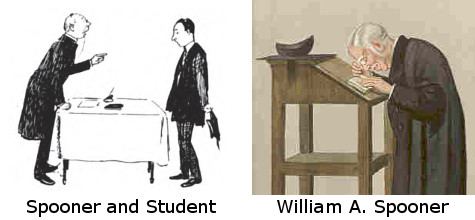William A. Spooner? Apocryphal?

Question for Quote Investigator: The funniest reproach aimed at a student that I have ever heard was spoken by Reverend William A. Spooner who was the Warden of New College, Oxford. The clergyman was famous for jumbling the letters and sounds of words when he spoke. His castigation of the student began with this curious remark:
You have hissed all my mystery lectures.
Unscrambling the statement revealed its meaning:
You have missed all my history lectures.
I know that most spoonerisms were never actually spoken by Spooner. Would you please explore the provenance of the short speech that began with the line above?
Reply from Quote Investigator: The earliest strong match for the phrase above found by QI was printed in “The Strand Magazine” in an article titled “Spooneriana” by A. T. Corke in 1911. Spooner lived from 1844 to 1930. Boldface has been added to excerpts:1
But the apotheosis of his vagaries is reached in this stern reprimand to an erring and, let us hope, repentant undergraduate: “Sir, your conduct has been nothing less than disgraceful; you have hissed three of my mystery lectures, you have been convicted of fighting a liar in the inner quad, and in addition, there is no doubt whatever in my own mind that you have tasted a whole worm!”
The text without the swapped elements would read as follows:
Sir, your conduct has been nothing less than disgraceful; you have missed three of my history lectures, you have been convicted of lighting a fire in the inner quad, and in addition, there is no doubt whatever in my own mind that you have wasted a whole term!
In some later versions of the passage above the student is told:
Please leave Oxford on the next town drain.
The final two words referred to the “down train”. This spoonerism was also included in a different section of the article in “The Strand Magazine”:
. . . his complaint to the station-master of the continued unpunctuality of the “town drain”
Below are additional selected citations in chronological order.
In 1919 “Chambers’s Journal” of Edinburgh, Scotland printed one of the humorous sayings:2
‘You have,’ he recently said to an idle youth, ‘tasted two whole worms, and you had better go down.’ ‘Wasted two whole terms’ was what he had at heart to say.
In 1924 “The Living Age” of Boston, Massachusetts published the following account in which three of the spoonerisms were spoken on separate occasions.3 The same text was reprinted in “The Kansas City Star” newspaper of Kansas:4
One student of New College insisted to his dying day that the Warden had rebuked him for ‘fighting liars’ in the quadrangle, and there is a story that he took his history class severely to task for ‘hissing all my mystery lectures.’ There is also a tale of an unfortunate graduate whose waste of time led to the accusation that he had ‘tasted two whole worms.’
In 1929 “The Windsor Magazine” published a facetious article “Of Spoonerism” by Anthony Bertram5
Dr. Spooner is supposed—apocryphally, I have no doubt—to have rebuked an undergraduate: “You have hissed my mystery lectures,” he is supposed to have said; “you have tasted a whole worm.” . . .
And then, what was there funny about the Doctor’s apparent meaning? Suppose the undergraduate had hissed his mystery lectures, wouldn’t that have been most reprehensible? We cannot treat things like that with laughter. No good mystery lecture could possibly go on with a young man hissing all the time. Or again, if the young man really had tasted a whole worm . . . oh, the repulsive cruelty of it . . . not merely a dead bit of worm, but the whole living happy creature. What was the R.S.P.C.A. doing?
The 1988 book “Get Thee to a Punnery” by Richard Lederer included the following version:6
You have hissed all my mystery lectures. You have tasted a whole worm. Please leave Oxford on the next town drain.
In conclusion, this series of spoonerisms was in circulation by 1911. QI hypothesizes that each of these well-designed comical fragments was constructed by a student or other humorist. It was unlikely that Reverend William A. Spooner inadvertently uttered these remarks.
Image Notes: Illustration by G. Morrow of William A. Spooner talking to a student from “The Strand Magazine” in December 1911. Caricature of William A. Spooner published in Vanity Fair in 1898; accessed via Wikimedia Commons.
Acknowledgement: Special thanks to the discussants on the ADS mailing list including Fred Shapiro, Stephen Goranson, and Wilson Gray.
Update History: On December 27, 2024 the format of the bibliographical notes was updated.
- 1911 December, The Strand Magazine, Volume 42, Spooneriana by A. T. Corke, Start Page 770, Quote Page 771, Column 2, Published by George Newnes, Strand, London. (HathiTrust) ↩︎
- 1919, Chambers’s Journal, Seventh Series, December 1918 to November 1919, Volume 96, A Chapter from a Journalist’s Diary by Sir Henry Lucy, Spoonerisms (September 30), Start Page 629, Quote Page 630, Column 1,Published by W. & R. Chambers, Limited, Edinburgh, Scotland. (HathiTrust Full View) ↩︎
- 1924 August 2, The Living Age, Section: Life, Letters, and the Arts, Spoonerisms, Start Page 238, Quote Page 239, Published by The Living Age Company, Boston, Massachusetts. (Unz) ↩︎
- 1924 August 24, Kansas City Star, Spoonerisms (Acknowledgment to The Living Age), Quote Page 14D, Column 6, Kansas City, Kansas. (GenealogyBank) ↩︎
- 1929, The Windsor Magazine: An Illustrated Monthly for Men and Women, Volume 69, Number 413, Of Spoonerism by Anthony Bertram, Start Page 709, Quote Page 711 and 712, Published by Ward, Lock and Company, London. (HathiTrust Full View) ↩︎
- 1990 (1988 Copyright), Get Thee to a Punnery by Richard Lederer, Section: Silver Spoonerisms, Start Page 119, Quote Page 120, A Laurel Book: Dell Publishing, New York. (Verified with scans) ↩︎